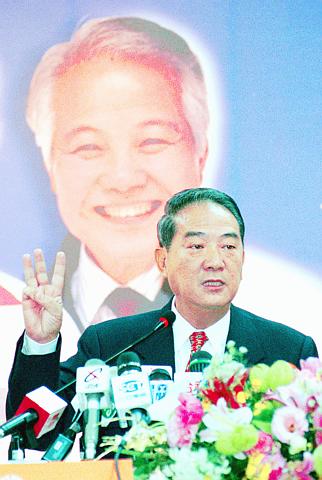In finally unveiling his cross-strait policy yesterday, independent presidential candidate James Soong (宋楚瑜) proposed that Taiwan and China sign a 30-year "mutual non-aggression peace treaty," which would be followed by a 20-year agreement basing relations on a European Union model.
Soong's running mate, Chang Chao-hsiung (
But political analysts said such a scheme would never be acceptable to China as it would entail recognizing Taiwan as an equal.

PHOTO: GEORGE TSORNG, TAIPEI TIMES
Soong also proposed that cross-strait relations be based on a "quasi-international relationship under relevant sovereignty (
Using such a definition, Soong called for both sides of the Taiwan Strait to sign a non-aggression pact, countries such as the US, Japan and ASEAN members.
When the 30-year agreement expires, both parties -- if they are not interested in changing the status quo -- should sign another 20-year agreement defining their relations based on the model of the European Union and in the status of sovereign nations, Soong said.
After that, he said, the people of Taiwan should determine whether to continue the process of integration.
When asked under what status Taiwan should sign the proposed 30-year non-aggression treaty with China, Chang replied: "Under the status of a nation. Signatories should be under the names of the Republic of China and the People's Republic of China."
This would never be palatable to China, according to political analysts.
"The real question here is China's attitude," said Joseph Wu (
Other scholars agreed.
"I'm afraid Beijing is not going to accept such a proposal. It's still a stalemate," said Hsu Szu-chien (
Hsu was equally scathing of Soong's rivals, however.
"None of these irresponsible presidential candidates has so far put forward any feasible proposal for dealing with the problem of cross-strait relations," Hsu said. "Candidates have to face the fact that there is a crisis, and they should be creative in devising ways to deal with it. The key is to involve the US and other Western countries, to use international frameworks such as the WTO, and forces for reform inside China."
Soong also took the occasion yesterday to rebut criticism from his opponents that he had been vague in his China policy.
"I am not ambiguous. I am neither for hasty unification nor for hasty independence, both of which are not mainstream ideas in Taiwan," Soong said. "My cross-strait policy is unambiguously aligned with mainstream public opinion in Taiwan."
While candidates try to pick holes in their rivals' China policies and to promote their own as somehow different, analysts said that all three of the main candidates' positions are virtually the same.
"In essence, all three are no different in their China policy," Wu said. "But this is good. It shows that people in Taiwan have built a strong consensus on the issue."
See Also:
Editorial

The CIA has a message for Chinese government officials worried about their place in Chinese President Xi Jinping’s (習近平) government: Come work with us. The agency released two Mandarin-language videos on social media on Thursday inviting disgruntled officials to contact the CIA. The recruitment videos posted on YouTube and X racked up more than 5 million views combined in their first day. The outreach comes as CIA Director John Ratcliffe has vowed to boost the agency’s use of intelligence from human sources and its focus on China, which has recently targeted US officials with its own espionage operations. The videos are “aimed at

STEADFAST FRIEND: The bills encourage increased Taiwan-US engagement and address China’s distortion of UN Resolution 2758 to isolate Taiwan internationally The Presidential Office yesterday thanked the US House of Representatives for unanimously passing two Taiwan-related bills highlighting its solid support for Taiwan’s democracy and global participation, and for deepening bilateral relations. One of the bills, the Taiwan Assurance Implementation Act, requires the US Department of State to periodically review its guidelines for engagement with Taiwan, and report to the US Congress on the guidelines and plans to lift self-imposed limitations on US-Taiwan engagement. The other bill is the Taiwan International Solidarity Act, which clarifies that UN Resolution 2758 does not address the issue of the representation of Taiwan or its people in

US Indo-Pacific Commander Admiral Samuel Paparo on Friday expressed concern over the rate at which China is diversifying its military exercises, the Financial Times (FT) reported on Saturday. “The rates of change on the depth and breadth of their exercises is the one non-linear effect that I’ve seen in the last year that wakes me up at night or keeps me up at night,” Paparo was quoted by FT as saying while attending the annual Sedona Forum at the McCain Institute in Arizona. Paparo also expressed concern over the speed with which China was expanding its military. While the US

SHIFT: Taiwan’s better-than-expected first-quarter GDP and signs of weakness in the US have driven global capital back to emerging markets, the central bank head said The central bank yesterday blamed market speculation for the steep rise in the local currency, and urged exporters and financial institutions to stay calm and stop panic sell-offs to avoid hurting their own profitability. The nation’s top monetary policymaker said that it would step in, if necessary, to maintain order and stability in the foreign exchange market. The remarks came as the NT dollar yesterday closed up NT$0.919 to NT$30.145 against the US dollar in Taipei trading, after rising as high as NT$29.59 in intraday trading. The local currency has surged 5.85 percent against the greenback over the past two sessions, central